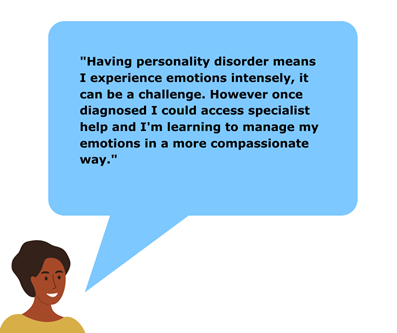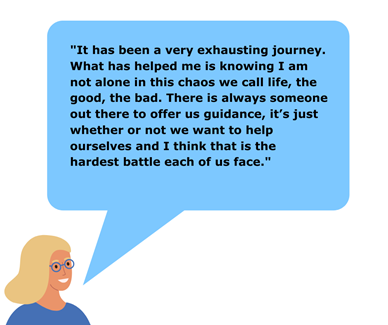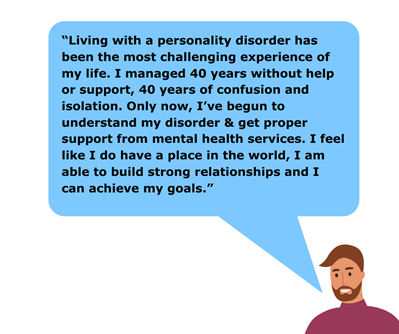The information you find here has been co-produced with service users with lived experience of Personality Disorder.
It doesn’t matter if, when or how you received the diagnosis, this information will still be relevant to you. It may also be useful for anyone who struggles to manage their emotions.
What is a personality disorder?
Our personality is the collection of thoughts, feelings and behaviours that makes each of us the individuals we are.
We don’t always think, feel and behave in exactly the same way – it depends on the situation we are in, the people around us and many other linked factors.
If you experience significant difficulties in how you relate to yourself and others and have problems coping day to day, you may receive a diagnosis of personality disorder.
The International Classification of Disease (11th revision; ICD-11) offers a comprehensive definition of Personality Disorder:
Personality refers to an individual’s characteristic way of behaving, experiencing life, and of perceiving and interpreting themselves, other people, events, and situations.
Personality Disorder is a marked disturbance in personality functioning, which is nearly always associated with considerable personal and social disruption.
The central manifestations of Personality Disorder are impairments in functioning of aspects of the self (e.g., identity, self-worth, capacity for self-direction) and/or problems in interpersonal functioning (e.g., developing and maintaining close and mutually satisfying relationships, understanding others’ perspectives, managing conflict in relationships).
Impairments in self-functioning and/or interpersonal functioning are manifested in maladaptive (e.g., inflexible or poorly regulated) patterns of cognition, emotional experience, emotional expression and behaviour.
Your experience of Personality disorder is unique to you
We now know that each person experiences Personality Disorder in a different way. Have a look at some of the quotes and analogies below from people who have been living with a Personality Disorder for some time.



Types of personality disorders
A wide range of people may get the same diagnosis, despite having very different personalities and different individual experiences. Your experience of living with a personality disorder will be unique to you.
Our understanding of what it means to experience a personality disorder is constantly evolving. It is a controversial diagnosis. People have different views about these terms, and not everyone agrees with using them.
The important thing to remember is that the feelings and behaviours associated with personality disorders are very difficult to live with. However you understand your diagnosis, and whatever terms you prefer to use, you deserve understanding and support.
Historically, the DSM & ICD Identified 10 Types of Personality Disorders: Paranoid personality disorder, Schizoid personality disorder, Schizotypal personality disorder, Antisocial personality disorder, Borderline personality disorder/Emotionally Unstable personality disorder, Histrionic personality disorder, Narcissistic personality disorder, Avoidant personality disorder, Dependent personality disorder and Obsessive compulsive personality disorder (OCPD)
However, the ICD-11 has simplified the above and a diagnosis of a Personality Disorder is now described in terms of its level of severity.
This model focuses on the impairment of the self and interpersonal personality functioning. You might not be presenting with all of the characteristics, but you will be able to identify with a few of them.
Cluster A
Odd thinking and eccentric behaviour
- Paranoid personality disorder
- Schizoid personality disorder
- Schizotypal personality disorder
Cluster B
Dramatic and erratic behaviour
- Antisocial personality disorder
- Borderline personality disorder
- Histrionic personality disorder
- Narcissistic personality disorder
Cluster C
Severe anxiety and fear
- Avoidant personality disorder
- Dependant personality disorder
- Obsessive-compulsive disorder
Controversial diagnosis
A Person is So Much More Than The Name Of A Diagnosis On A Chart – Sharon Draper
The diagnosis of ‘personality disorder’ can be controversial because:
- Specialists disagree about how to understand personality disorders: Most people who are diagnosed with a personality disorder do not fit any one category, and historically may be diagnosed with more than one type. Some people believe the focus should instead be on what each person needs in order to deal with their problems and discover new ways of living, not what category they are in.
- The diagnosis doesn’t take social context into enough account: People are complicated. There are many social factors that can affect our capacity to cope, to relate to others and to respond to stress. Invalidating environments and trauma can lead to you often feeling overwhelmed with unbearable feelings. This can make it very difficult to deal with the daily challenges of adult life.
- The term itself can be stigmatising: Some people feel that the term ‘personality disorder’ can sound very judgmental. Being given a diagnosis or label of personality disorder can feel as if you’re being told there’s something wrong with who you are. You may feel upset, insulted and excluded. Language evolves and it may be that a different term will be used by professionals in future.
Some people with this diagnosis hold the view that their feelings and behaviours are a reasonable, human reaction to going through difficult life experiences. So it’s unhelpful and upsetting to call it an illness or ‘disorder’ in their personality. They argue that professionals should consider what in their life may have contributed to their difficulties, and help with these. Not focus on finding problems in them as an individual.
On the other hand, some people find that getting this diagnosis helps them to name and understand their experiences, to explain themselves to other people, and sometimes get treatment and support they otherwise might not.
Language evolves and it may be that a different term will be used by professionals in future. It may perhaps be better understood as ‘complex and severe psychological difficulties’, ‘complex trauma’ or ‘emotional and interpersonal dysregulation disorder’. Often individuals with the diagnosis will have a preference as to what to call it; it is a matter of personal choice!
Difficulties you may be experiencing
A diagnosis of ‘Personality Disorder’ is characterised by some of the experiences and behaviours that are outlined:
- Feeling lonely and empty
- Identity disturbance
- Intense unstable relationships
- Intense emotions that can change quickly
- Anger outbursts
- Impulsive behaviour
- Self harming and suicidal tendencies
You do not need to experience all of these difficulties to have a diagnosis of Personality Disorder. Therefore, people’s experience of their diagnosis is unique to them. Meaning that two people with the same diagnosis can experience a different mixture of these difficulties at the same time.
What causes personality disorder?
Everyone’s experience of a personality disorder is unique. However, the following factors are known to increase the risk of developing a personality disorder:
- Genetic predisposition/vulnerability
- Early experiences and social circumstances
Genetic vulnerability
Genetic vulnerability refers to the elements of our temperament, personality, and characteristics of our nervous system that are present at birth and make us vulnerable to developing a personality disorder.
You may often hear mental health professionals discuss the terms ‘emotional dysregulation’ and ‘emotional sensitivity’. This is because emotional dysregulation is one of the core characteristics of a Personality Disorder. It refers to an emotional response which is poorly regulated and disproportionate to the event that activates it. It is also believed that individuals with a Personality Disorder are born with an increased sensitivity to emotional stimuli. Meaning that you may react to events that others wouldn’t have a reaction to, experience emotions more intensely than others, and take a longer time to recover back to emotional baseline after an emotional reaction.
However, genetics alone do not cause someone to develop a personality disorder. Instead, it is believed that personality disorder is caused by a combination of genetic predisposition to emotional sensitivity and an invalidating environment during childhood.
Early experiences and social circumstances
Having a genetic vulnerability alone is not enough. Early life experiences shape the way we view ourselves and others around us. This is because as infants, we rely on our primary caregiver to meet our emotional and physical needs for survival. However, negative life experiences in childhood which invalidate our feelings and needs can cause us to become more sensitive to our environments as a way to survive. They may also lead us to develop maladaptive coping strategies and negative beliefs about how relationships work. Some of the negative or adverse experiences that can lead us to develop a negative view about ourselves and the world around us are; neglect, invalidation/invalidating environments, abuse (physical, emotional or sexual), household dysfunction, etc.
Neglect
Neglect refers to the absence of emotional support. Emotional neglect is defined as a relationship pattern with the primary caregiver in which the infant’s emotional needs are ignored, invalidated, or disregarded. Neglect may occur if the primary caregiver is consistently absent due to having to work, or if they are not emotionally available to meet our needs due to their own struggles with physical or mental health.
Invalidation/Invalidating Environment
An invalidating environment is one in which there is a tendency to deny or respond inappropriately to a child’s inner experience e.g. their thoughts, emotions and physical sensations (things which cannot be seen on the outside). There are many ways an environment can be invalidating – some are more obvious like an abusive home and some more subtle like being told “stop crying” or “don’t overreact”.